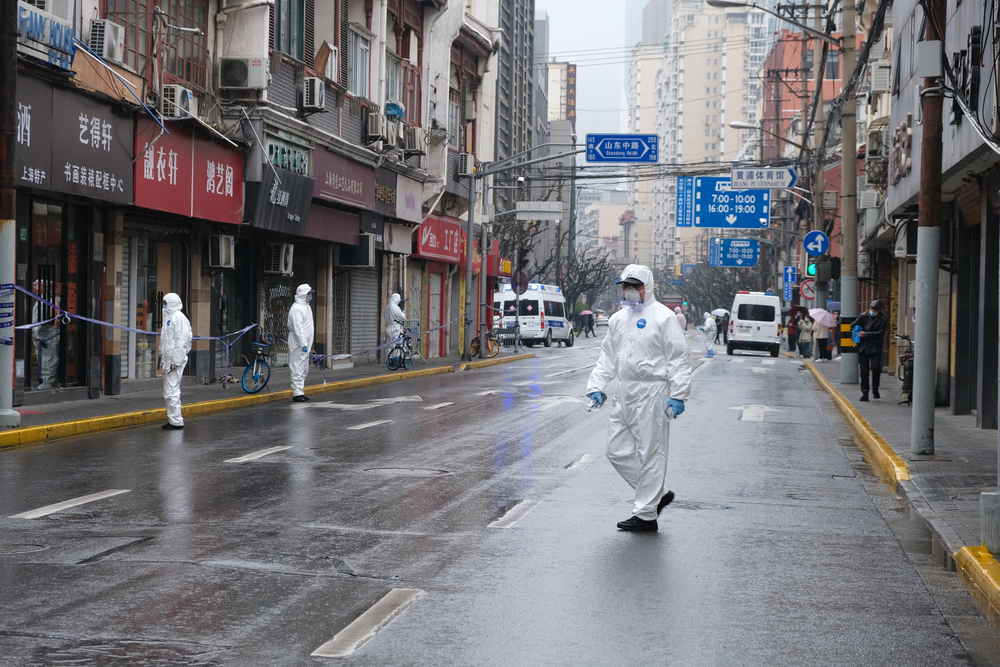After confirming a positive Covid-19 case in the city of Xi’an on 9 December 2021, the city government imposed a lockdown on 22 December. Coming to an end on 24 January 2022, the month-long lockdown revealed the extent to which cities are dependent on low-earning frontline workers and just how shaky labour protections are.
China’s epidemic prevention strategy is heavily reliant on quarantine hotels to keep Covid-19 from spreading among the wider population. Frontline workers in these facilities not only face high risks of infection, but also low pay and little financial security.

Photograph: Robert Way / Shutterstock.com
The account posted online of the 9 December positive case reveals that workers are inadequately prepared for this work and are also acutely vulnerable economically.
The worker, surnamed Xiang, is a recent nursing graduate who received only two days of training prior to being sent to work in Jincheng hotel, a designated quarantine hotel in Xi’an. He was responsible for disinfecting rooms, delivering meals, and collecting trash. He worked on two teams concurrently, as the contracting company wished to cut costs. The contractor concealed from the hotel that it had hired students or workers with little experience.
Xiang was paid a salary of 150 yuan per day, 30 yuan of which the contractor kept. On 4 December, he moved luggage for guests who had just checked in. After completing this task, Xiang discovered that his protective clothing had two holes in the arm area, about the width of two fingers. Though the rules state that he should have changed his clothing right away, his manager did not require him to do so or request that he be quarantined.
After Xiang tested positive and was hospitalised, other colleagues at Jincheng hotel also contracted Covid-19, including Xiang’s roommate, surnamed Zhang. But Xiang’s manager did not check in to ask how Xiang was faring, even though he was infected while on the job.
When Xiang asked for his hospital and food bills to be covered, the response from management was lacking, and he compared his treatment to being “kicked around like a football.” His requests for his salary were met with no reply.
While in hospital, he faced online attacks on his character and also his manager’s unwillingness to take any financial responsibility for his illness. In WeChat screenshots posted online, his manager, surnamed Su, blamed Xiang, saying that his work was “shoddy.”
The manager also defended his own actions of going out for hotpot - while frontline workers are confined to the hotel premises - saying, “What’s that to you?”
Another manager offered to lend Xiang 3,000 yuan but expected the money back after recovery.
In his account, Xiang writes, “Why am I not paid my salary while in hospital? Why do they have to take money from exhausted frontline workers?”
Xiang’s case is far from the only one of poor treatment suffered by frontline workers in Xi’an. Four cleaners were fired for taking food from a flat owner, though they were motivated by sheer hunger. Migrant workers trapped in Xi’an found that they were distributed goods that were worse than those received by local residents. Temporary workers have not been able to invest in cooking equipment, subsisting on a diet of instant noodles, so government distribution of vegetables to each resident was of little use.
Two years into the Covid-19 pandemic, governments at all levels should value and protect frontline workers and learn from past mistakes. The Nanjing airport outbreak in the summer of 2021, for example, also stemmed from improper practices of outsourced and overworked sanitation workers. We also investigated the role of trade unions in Wuhan’s lockdown in early 2020. Our investigations reveal that basic health and safety protections for workers are lacking when these should be the highest priority, and that workers need effective advocates in the trade union. This is not only essential for these workers, but for the protection of the general public and combating the spread of Covid-19 and its subsequent variants.
Contract workers, in particular, have little recourse or institutional support. They are among the lowest paid for their labour, without which cities could not run. They also face discrimination and economic insecurity. The lockdown in Xi’an reveals just how much the blatant disregard for labour protections puts workers and the general population at risk.
